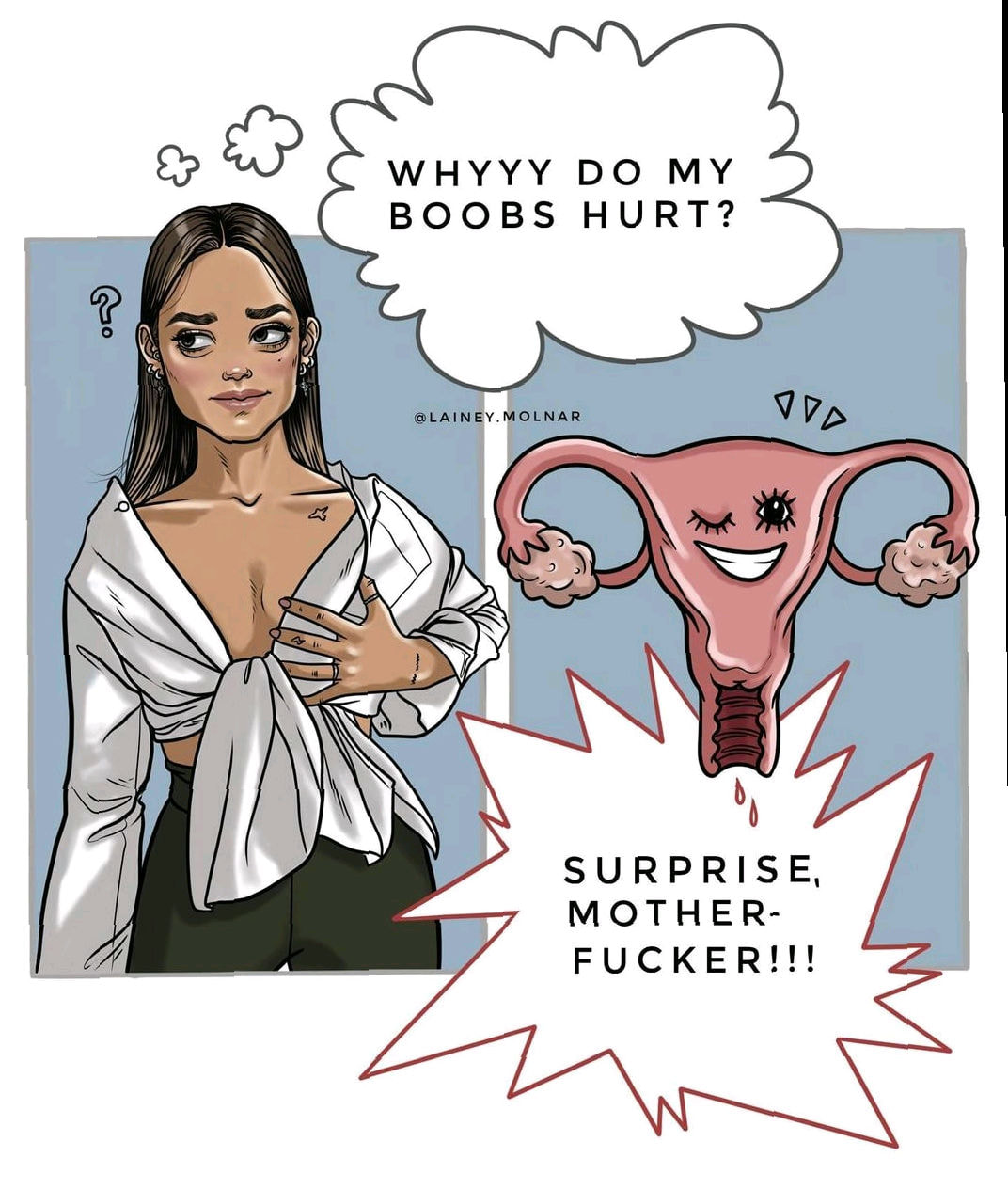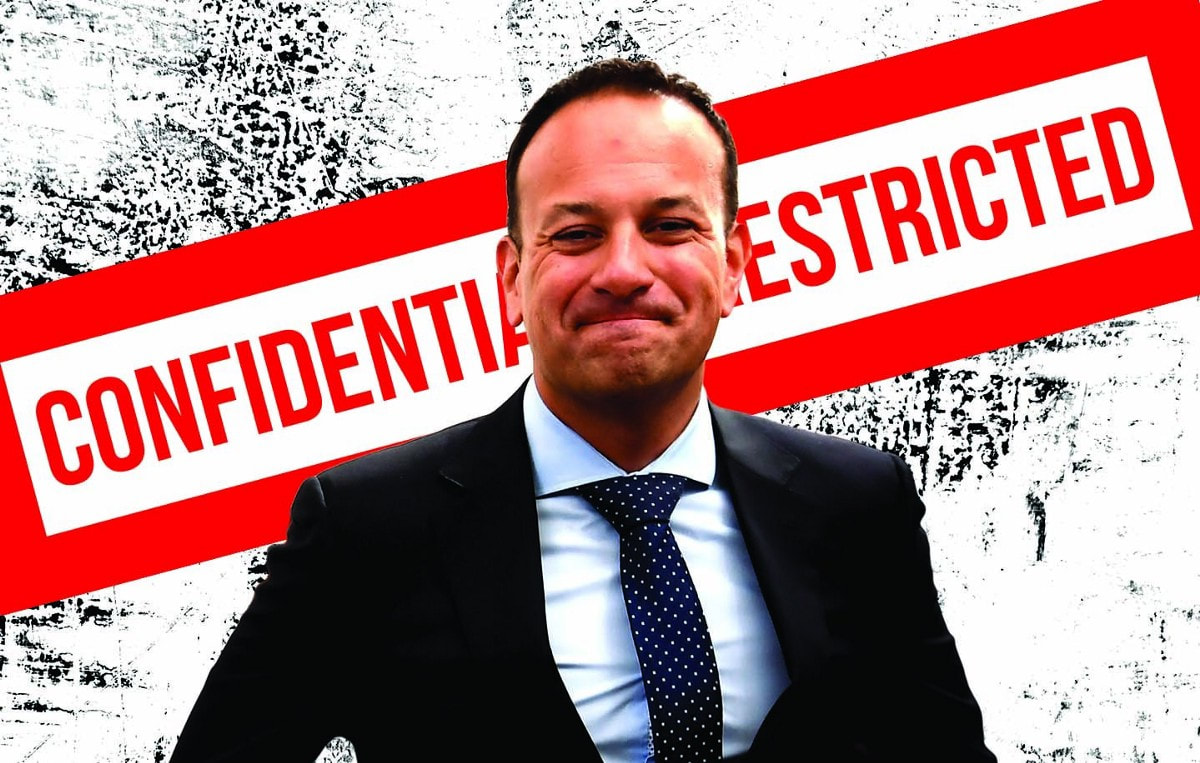|
Lainey Molnar has taken social media by storm. Her drawings depict the way the world perceives women as opposed to the way a lot of real women actually are. I’ve always been honest and transparent about my mental health journey, especially after being diagnosed with bipolar and beating the illness after stepping on the way of spirituality, lightwork and finally happiness. I believe that the pressure on women comes from both inside our own community and outside, be it family, media, or men. It is incredibly hard to navigate all of their expectations and reach the milestones society has set out for us, like maintaining the perfect size and shape, being maternal but also ambitious, strong but also sensitive, staying youthful and fresh while gracefully accepting the aging process, looking ideal but not overdoing plastic surgery. I could go on and on and on, and we are all so tired of this. Can we make mass media stop making us feel like the only way to deal with periods is pretending they don't exist. There are hundreds of millions of us bleeding every few weeks and especially for someone like me, who gets excruciating cramps and spends days crying in the fetal position guzzling pain killers. Its not very inspiring to to see women in ads giggling in white outfits. Leakage is usually the least of my concerns. Its part of life and not shameful, we can talk about it, we can go through the symptoms without suppressing them and we should be able to choose a tampon/pad/cup brand without them making us feel inadequate. Life choices don’t range from wrong to right based on societal expectations. The last 30 or so years the world turned upside down - the internet, social media, dating apps, remote work, digital nomads, startups, cheap air travel, EU, globalization, and the cracking of the glass ceiling raised generations of women whose priority isn’t marriage or children. We are the 30-something Lost Boys, half of our friends our age buy houses and raise families and the other half is still at school, figuring themselves out. There’s a constant pressure of missing out on something and the constant validation of freedom.
0 Comments
On Tuesday 10th of November there was an historic motion of no confidence in the sitting Tainiste and leader of Fine Gael, Leo Varadkar. An unusual event in Irish politics that won’t be forgotten too easily.
What brought this about is a character named Chay Bowes disclosed a series of WhatsApp messages to Village Magazine, frustrated by what he described as vested interests subverting the common good. Village magazine didn’t hold any punches, publishing a story about the leaking of a confidential document. The Village front cover screamed Leo, Law Breaker. A headline that would generate public uproar in any country but our own. The article could also have created an opportunity for an aspiring party member with their eyes on leadership to call on Leo to step down. However Fine Gael remained tightly knit and neither a past nor present TD spoke out against what had been painted as an old boys club tethering on corruption. The article itself warned of a potential quid pro quo for Varadkar, a breach of the ethics act, a potential breach of the Official Secrets Act and a Crime under the Corruption Act. The evidence laid out in the magazine prompted TD Paul Murphy to make a complaint to the political standards watchdog; SIPO. Later in the month FF appointed Geraldine Feeney, a former lobbyist for NAGP, to sit on SIPO. The president of NAGP was at the centre of the controversy having received the leaked document from Leo, from an outsider’s perspective it seemed like poor timing to make this appointment and hard to swallow that it wasn’t intended to influence the outcome of an investigation into misbehaviour by the former Taoiseach. Back to the vote on the 10th of November, in what was most likely a matter that should have been dealt with internally, the political parties ended up trading blows over Fine Gaels dirty laundry. Of course it was full of bluster, with more mentions of Sinn Fein than Leo Varadkar and the Labour Party seemed unclear about which side of the house they were sitting on. The following is a summary of the debate without the mudslinging and bluster: Micheal Martin: No one has demonstrated any personal gain from how the document was distributed and public policy was not adversely impacted. The Tánaiste has acknowledged his error and all details have been published. Lessons have been learned all round and Ministers realise such situations should not occur during this Government. Simon Coveney: Leo Varadkar has been a colleague of mine for many years and he is a person I have grown to know well and trust. Leo's motivation in bringing the National Association of General Practitioners, NAGP, into the fold on a new GP contract was well-meaning but it did take a shortcut. He should not have mailed the document to the NAGP president. He should instead have had the association briefed officially. The Tánaiste has apologised for this and said that it was wrong and not best practice. The Tánaiste has already been before this House to explain himself thoroughly and to take questions. It is obvious now that for some what is ongoing is not about establishing facts or truth but about sustaining a political smear campaign masquerading as whistle-blowing to inflict maximum political damage. Heather Humphreys: There is one politician who knows the meaning of the national interest and that is Leo Varadkar. When our country faced some of its darkest hours this year, Leo Varadkar was there. He led from the start and he led from the front. Mary Lou McDonald: When he was Taoiseach, Leo Varadkar leaked a confidential draft contract to a third party, to his friend. The refusal of the current Taoiseach to hold the Tánaiste and leader of Fine Gael to account left a no confidence motion as the only sanction available to us as an Opposition. The truth is that if a junior civil servant or any departmental official leaked a confidential document they would be sacked, end of story. When Leo Varadkar leaked this document he was the Taoiseach. He was the head of government and that position comes with the highest level of responsibility, with the greatest need for ethical and honest conduct and, therefore, it comes with a greater demand for accountability. Aodhan O’Riordain: The Labour Party told the Tánaiste to come clean, to tell the truth, to dispense with the incredible yarn he had been peddling and to apologise, and perhaps there may have been a way out for him. However, the Tánaiste chose not to do that. He persisted with the line that he was leaking the document for the good of the document, a statement that takes the entire country for fools. The question is not only should the Dáil have confidence in him, but should any trade union have confidence that they can negotiate with this Government in good faith, or should any Minister have confidence that they can share a confidential document with the Tánaiste in good faith. The fact is, in all honesty, they cannot. Eamon Ryan: Having listened to the Tánaiste set out his version of events, his admission that what had happened was not right and his apology for such an error of judgment. We accepted that apology. Paschal Donohoe: I express my full confidence in the Tánaiste, Deputy Varadkar. I have served in government with the Tánaiste since 2014 and knew him for many years before that. The personal and political qualities I have known in him in that time have been apparent again in recent weeks - his openness, honesty and accountability; his genuine commitment to advancing the public interest; and his willingness to acknowledge a mistake. Leo Varadkar's politics are those of decency, progress and doing the right thing by our country. His track record is clear in the leadership he demonstrated in delivering the best outcomes for our country in the many challenges of Brexit; his empathy and decisiveness in leading our country through a demanding and dark phase of Covid-19; and his unstinting support for the management of the economy, public pay and public finances, which has enabled us to meet this moment of challenge from a position of strength Eoin O’Broin: The simple fact is that the leader of Fine Gael broke the rules. He breached the confidentiality of Cabinet and sensitive Government contract negotiations, all to give a dig out to a friend. If anyone did this in any other job, they would be sacked. Just because he was the head of Government does not mean that lower standards should be applied It seems that Fine Gael is fertile recruiting ground for lobbyists who trade in access and influence. All of this has a price. Ordinary people pay the consequence for such insider trading. It is time to end low standards in high places, time to end insider dealing and time for a Government that looks out for everyone and not just its friends. Roisin Shortall: The Tánaiste first tried to make out that the confidential document which he leaked was somehow not confidential, despite it being clearly marked "Confidential, not for circulation". This was a negotiation document that was still in process with the IMO. The Tánaiste tried to make out that what he did was some kind of noble action, that he had a legitimate objective and that he was honouring the Government commitment. There was no basis whatsoever for this claim. Anyone who knew anything about medical politics at the time knew that the row between the NAGP and the IMO was vicious. The Tánaiste had been a member of the IMO and, anyway, he had lots of friends who were GPs from both organisations, as he has told us. We know the intention of the NAGP's inner sanctum was to scupper the IMO's win on the contract negotiations and to upstage the IMO on the eve of its annual general meeting by releasing details of the arrangement. Not only was the Tánaiste aware that he should not have interfered with the work of the Minister for Health but he also knew that, according to the Cabinet handbook, he was bound by the officeholders' code of conduct which states that officeholders should respect confidences entrusted to them in the course of their official duties. The Tánaiste clearly breached this requirement. His Trumpian defence that he, as Taoiseach at the time, was the arbiter of what he was allowed to do is laughable. Simon Harris: Leo Varadkar is a committed, energetic, smart and sincere leader. I have seen his judgment at first hand during the Covid-19 pandemic and his leadership in trying to keep us all safe as we grappled with a deadly virus. We would not have a new general practice agreement were it not for his leadership. He set it is an absolute priority on becoming Taoiseach. He brought Departments together around the table, banged heads, set objectives, timelines and funding streams and he got it done. When the Tánaiste made a mistake, he apologised. Everybody makes mistakes and I am sure none of us wishes to be defined by them. Paul Murphy: Fianna Fáil and Fine Gael are uniting to defend corrupt behaviour while the Green Party is asleep at the wheel. Tonight, Leo Varadkar will get away with it as a result. He will face no consequence as a result of breaking the code of conduct for Deputies, breaking the code of conduct for officeholders, and committing a crime under the Criminal Justice (Corruption Offences) Act. *(Ceann Comhairle noted the commission of crimes is something that is adjudicated on by a court of law, not by any of us sitting here in Dáil Éireann. Paul Murphy rephrases his statement to accommodate) Hildegarde Naughton: The Tánaiste made himself available and accountable last week for detailed questioning by Deputies. He answered completely and honestly. He has admitted he should have done things differently and he apologised for it. Everyone in politics makes mistakes. It is human nature. Some mistakes are more serious than others. The Tánaiste's error is certainly not one that warrants resignation. It was a mistake of process rather than substance. Joe McHugh: The Tánaiste, Deputy Varadkar, is a politician who gets things done. As Taoiseach he worked hard to get so many things done. As Taoiseach, he worked very closely with his Cabinet colleagues and he was always informed. He was solution focused and was always determined to find a solution, even in the most difficult of circumstances. He took his mandate as Taoiseach very seriously and at all times was conscious of the enormous responsibility placed on his very young shoulders. The Tánaiste does not wear his heart on his sleeve but that does not diminish his passion to serve all the people or his ambition to get things done. Pearse Doherty: The issues at stake are very clear. Deputy Varadkar, as Taoiseach in 2019, gave a confidential draft document, a contract worth €210 million that was still under discussion with the IMO, to his friend, the president of a rival organisation, on his request. It was done not through official channels but through private text messages before deleting all traces of the correspondence. A friend of the Taoiseach requested a confidential Government document by text message and Leo delivered. End of. If a civil servant did the same, it would constitute gross misconduct, trigger disciplinary action and be grounds for dismissal The Tánaiste's excuse for leaking the confidential documents simply does not hold up. He claims it was some part of a mastermind strategy to get the contract over the line, but strategy requires initiative. This was at his initiative. It was his friend who requested the document from the Minister for Health. That Minister refused to give it to him because it was confidential but Leo delivered for his friend. When he was asked to get it, he obliged. He did so in secret and without telling anyone, covering his tracks and deleting the correspondence. He claims leaking the document was part of a strategy to engage with the NAGP but we know there was no engagement with the NAGP on the part of the Government or the Department of Health. Indeed, the only engagement was when Deputy Varadkar stuck a confidential document in the post to give to his friend, the head of the organisation that was rival to the IMO. The Tánaiste says the agreement was in the public domain but it was not. Every single one of the 130 pages had stamped across it, “Confidential. Not for circulation.” We are aware there were at least 35 further changes. The Tánaiste has been caught red-handed. He leaked confidential, commercially sensitive Government information to a friend. He and his Government colleagues believe he is above accountability but he is not, nor should he be. Peter Fitzpatrick: What the Tánaiste did in handing over confidential documents to a GP friend was wrong. That the then Minister for Health, Deputy Harris, was not aware of that sharing of information was also wrong. It displayed a lack of trust in the then Minister. The bottom line is that the then Taoiseach, Leo Varadkar, displayed a complete lack of judgment and undermined his colleagues in government and in his party. If such a situation involving one of his colleagues in government were to arise, I doubt that the Tánaiste would take the same approach. The record speaks for itself in this regard, with the Tánaiste having thrown colleagues under the bus in the past in similar situations. I reiterate that Leo Varadkar has done wrong. He needs to face the consequences of his actions. In my opinion, his party needs to reprimand him. It is Fine Gael's responsibility to deal with this matter I will support the motion of confidence in the Tánaiste. This is not because I believe that he did nothing wrong. In fact, what he did was wrong and he should face the consequences for doing it, but action should be taken by his party, Fine Gael. The Government has far more important issues to deal with than this. Richard Bruton: We are sent here to try to resolve differences and conflicts, not to create division. Leo Varadkar is a politician who has done that throughout his career. He sought to progress change in a community where he understood that change is disruptive and can hurt people. He has sought to bring people with us. People are looking to politics now for competence and compassion. That is what Leo Varadkar has shown, especially during this difficult Covid-19 crisis, but his political opponents want to drag him down. Carol Nolan: I am concerned about the lack of consistency with regard to sanctions. We have seen several Oireachtas Members already sanctioned this year and the year has not yet ended. The general public are asking politicians like me why there is no consistency in sanctions and a lack of consistency in this case. The lack of sanction in this case forced the hand of the Opposition. In that respect, the fault lies with the Tánaiste and the Government alone. On account of this fact and this stark reality, I will be voting no confidence in the Tánaiste. Marian Harkin: The document should at the very least have been passed on through formal channels. The Tánaiste came before the Dáil last week, accepted his errors of judgment and apologised. He made a serious mistake but has apologised publicly more than once. In my opinion, intent matters as much as, if not more than, process. While the process was wrong, I accept the Tánaiste's explanation that his intent was good in that it was to secure universal acceptance of a GP contract across the GP community. Yesterday, an article was published purporting to show that the Tánaiste had deliberately attempted to mislead the Dáil as to the extent of his friendship with Maitiú Ó Tuathail. I have looked at that evidence, which consists largely of WhatsApp messages from Maitiú Ó Tuathail. Running through the messages is a pervasive sense of entitlement: "We are the boys who run the show, or who should run the show." Underpinning these flights of fancy was the claim of easy access to the Tánaiste and senior Ministers. However, Dr. Ó Tuathail has in media reports accepted the Tánaiste's version of events, namely, that they had three meetings, so I see no evidence of a smoking gun. I have not deviated from the subject in hand to make political points. There are many to make, but I have not done so. For me, this is not about political point-scoring; it is about the matter in hand. As already stated, intent matters as much as, if not more than, process. In these circumstances, I believe that the former outweighs the latter and I will vote confidence in the Tánaiste. Thomas Pringle: The Tánaiste could simply apologise and step down, as a previous Tánaiste, Frances Fitzgerald, did. There is no excuse for Fianna Fáil and Green Party Deputies to say they have confidence in the Tánaiste. He undermined best practice in the context of standards in public office - this much he has admitted - and should now face the consequences of his actions. If the Tánaiste thinks that "Welfare cheats cheat us all", what does he think about politicians who behave as if they are above the standards set for us and for those in the Civil Service? Who is cheated then? The electorate is definitely cheated, as are those of us elected representatives who try to earn the public's trust in politics. Helen McEntee: I have worked with the Tánaiste for eight years. I have seen how he works with other people and with organisations, political parties and colleagues. I have seen how he has worked in difficult situations with challenging problems as he tries to ensure that he listens to every single position put forward and that the best outcome is reached for everybody concerned. One does not have to work with him closely to see this; one need only look at the work he has done on Brexit. He is an honourable person. He cares about his work. People say he is ambitious. To be an ambitious public representative is to ensure the best possible outcome in everything one does for the people whom one represents. As Taoiseach, one of Deputy Varadkar's priorities - and he made no secret of this - was to ensure that a deal was reached for a new GP contract. He is a former Minister for Health and someone who has trained as a GP and who saw the benefits of the contract, not just for patients but also for GPs and the wider public. This was his sole motive in sharing this document with the NAGP. He has apologised for how this was done but has also answered every question put to him in the House. Leo Varadkar: I wish to restate my apology to the House. I am sorry for my actions that gave rise to tonight's motion and I accept sole responsibility for them. While my motivations were sound, the manner in which I conducted myself was not. I do regret this and I have learned from it. This is the first time I have faced a motion of no confidence or a motion of confidence in my career. It forces me to reflect on the decisions I have made and the things I could have done differently and would do differently in future. |
The Champs VoiceInteresting stories from around the web Categories
All
Archives
February 2022
|






 RSS Feed
RSS Feed
